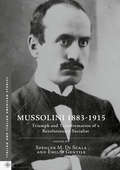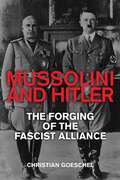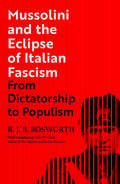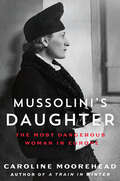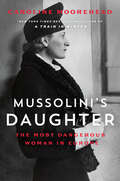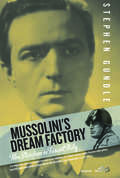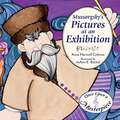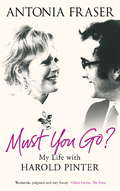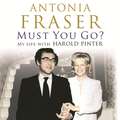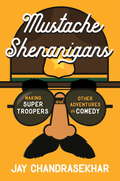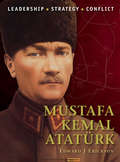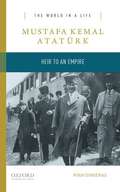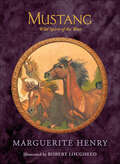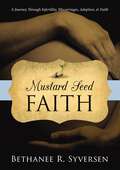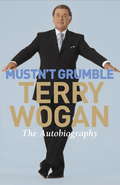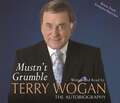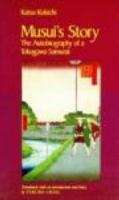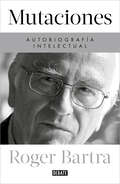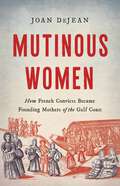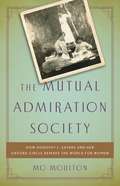- Table View
- List View
Mussolini 1883-1915
by Spencer M. Di Scala Emilio GentileThis book describes Mussolini's little-known radical ideology, including his activities in Switzerland, relationship with revolutionary syndicalism, and radical journalism. It provides an in-depth treatment of the young Benito Mussolini as a revolutionary Socialist and describes the political maneuverings that took a major European Socialist party by storm before the First World War. It explains the process of how he came to dominate Italian Socialism until the crisis caused by Italy's intervention in World War I. It illuminates Mussolini's leadership qualities and his rise to leader of the Italian Socialist Party.
Mussolini and Hitler: The Forging of the Fascist Alliance
by Christian GoeschelThis fresh treatment of Fascist Italy and Nazi Germany reveals how the close relationship between Mussolini and Hitler influenced both men.From 1934 until 1944 Mussolini met Hitler numerous times, and the two developed a relationship that deeply affected both countries. While Germany is generally regarded as the senior power, Christian Goeschel demonstrates just how much history has underrepresented Mussolini’s influence on his German ally.A scholar of twentieth-century Germany and Italy, Goeschel revisits all of Mussolini and Hitler’s key meetings to examine how they constructed a powerful image of a strong Fascist-Nazi relationship that still resonates with the general public. His portrait of Mussolini draws on sources ranging beyond political history to reveal a leader who, at times, shaped Hitler’s decisions and was not the gullible buffoon he’s often portrayed as. The first comprehensive study of the Mussolini-Hitler relationship, this book is a must-read for scholars and anyone interested in the history of European fascism, World War II, or political leadership.
Mussolini and the Eclipse of Italian Fascism: From Dictatorship to Populism
by R. J. BosworthAn incisive account of how Mussolini pioneered populism in reaction to Hitler&’s rise—and thereby reinforced his role as a model for later authoritarian leaders On the tenth anniversary of his rise to power in 1932, Benito Mussolini (1883–1945) seemed to many the &“good dictator.&” He was the first totalitarian and the first fascist in modern Europe. But a year later Hitler&’s entrance onto the political stage signaled a German takeover of the fascist ideology. In this definitive account, eminent historian R.J.B. Bosworth charts Mussolini&’s leadership in reaction to Hitler. Bosworth shows how Italy&’s decline in ideological pre-eminence, as well as in military and diplomatic power, led Mussolini to pursue a more populist approach: angry and bellicose words at home, violent aggression abroad, and a more extreme emphasis on charisma. In his embittered efforts to bolster an increasingly hollow and ruthless regime, it was Mussolini, rather than Hitler, who offered the model for all subsequent authoritarians.
Mussolini in Ethiopia, 1919–1935
by Robert MallettMussolini in Ethiopia, 1919–1935 looks in detail at the evolution of the Italian Fascist regime's colonial policy within the context of European politics and the rise to power of German National Socialism. It delves into the tortuous nature of relations between the National Fascist Party and the National Socialist German Workers' Party (NSDAP), while demonstrating how, ultimately, a Hitler-led Germany proved the best mechanism for overseas Italian expansion in East Africa. The book assesses the emergence of an ideologically driven Fascist colonial policy from 1931 onwards and how this eventually culminated in a serious clash of interests with the British Empire. Benito Mussolini's successful flouting of the League of Nations' authority heralded a new dark era in world politics and continues to have its resonance in today's world.
Mussolini's Daughter: The Most Dangerous Woman in Europe
by Caroline MooreheadThe bestselling author of A Train in Winter returns with the definitive story of Mussolini&’s daughter, Edda, one of the most influential women in 1930s Italy, whose life had more twists and turns than a spy novel.Edda Mussolini was Benito's favourite child: spoiled and venal, uneducated but clever, faithless but flamboyant, a brilliant diplomat, wild but brave, and ultimately strong and loyal. For much of the twenty-year period of Fascist rule, she was her father's closest confidante.In 1930, at the age of nineteen, Edda married Count Galeazzo Ciano, who would become the youngest Foreign Secretary in Italian history. Acting as envoy to both Germany and Britain, Edda played a part in steering Italy to join forces with Hitler. During this time, the Cianos became the most celebrated and glamorous couple in elegant, vulgar Roman fascist society.Their fortunes turned in 1943, when Ciano voted against Mussolini in a plot to bring him down, and his father-in-law did not forgive him. Edda's dramatic story includes hidden diaries, her father's downfall and her husband's execution, and an escape into Switzerland followed by a period in exile. Moorehead draws a portrait of a complicated, bold, and determined woman—one who emerges not just as a witness but as a key player in some of the twentieth century's defining moments. And we see Fascist Italy with all its glamour, decadence and political intrigue, and the turbulence before its violent end.
Mussolini's Daughter: The Most Dangerous Woman in Europe
by Caroline MooreheadThe New York Times bestselling author of the acclaimed Resistance Quartet returns with the incredible story of Mussolini’s daughter, Edda, one of the most influential women in 1930s Italy and a powerful proponent of the fascist movement.Edda Mussolini was the Italian dictator Benito Mussolini’s oldest and favorite child. At 19, she was married to Count Galleazzo Ciano, Il Duce’s Minister for Foreign Affairs during the 1930s, the most turbulent decade in Italy’s fascist history. In the years preceding World War II, Edda ruled over Italy’s aristocratic families and the cultured and middle classes while selling Fascism on the international stage. How a young woman wielded such control is the heart of Caroline Moore’s fascinating history. The issues that emerge reveal not only a great deal about the power of fascism, but also the ease with which dictatorship so easily took hold in a country weakened by war and a continent mired in chaos and desperate for peace.Drawing on a wealth of archival material, some newly released, along with memoirs and personal papers, Mussolini’s Daughter paints a portrait of a woman in her twenties whose sheer force of character and ruthless narcissism helped impose a brutal and vulgar movement on a pliable and complicit society. Yet as Moorehead shows, not even Edda’s colossal willpower, her scheming, nor her father’s avowed love could save her husband from Mussolini’s brutal vengeance.As she did in her Resistance Quartet, Moorehead delves deep into the past, exploring what fascism felt like to those living under it, how it blossomed and grew, and how fascists and aristocrats joined forces to pursue ten years of extravagance, amorality, and excessive luxury—greed, excess, and ambition that set the world on fire. The result is a powerful portrait of a young woman who played a key role in one of the most terrifying and violent periods in human history.
Mussolini's Dream Factory
by Stephen GundleThe intersection between film stardom and politics is an understudied phenomenon of Fascist Italy, despite the fact that the Mussolini regime deemed stardom important enough to warrant sustained attention and interference. Focused on the period from the start of sound cinema to the final end of Fascism in 1945, this book examines the development of an Italian star system and evaluates its place in film production and distribution. The performances and careers of several major stars, including Isa Miranda, Vittorio De Sica, Amedeo Nazzari, and Alida Valli, are closely analyzed in terms of their relationships to the political sphere and broader commercial culture, with consideration of their fates in the aftermath of Fascism. A final chapter explores the place of the stars in popular memory and representations of the Fascist film world in postwar cinema.
Mussolini's Shadow: the Double Life of Count Galeao Ciano
by Ray MoseleyBiography of Mussolini's foreign minister.
Mussorgsky's Pictures at an Exhibition (Once Upon a Masterpiece #2)
by Anna Harwell CelenzaWhen his friend Victor suddenly dies, composer Mussorgsky is deeply saddened. But, with the help of his friends, and through his own music, Modest finds a way to keep Victor's spirit alive.Readers of all ages will enjoy the inspirational story behind the composition of Pictures at an Exhibition. Bright, colorful illustrations incorporate elements of Russian folk art and traditional symbols. View pages from artist JoAnn Kitchel's notebook for explanations of the symbols and see her pencil-sketch research of the Russian culture.This handsome book and CD recording provide enrichment for the whole family.
Must You Go?: My Life with Harold Pinter
by Antonia FraserA moving testament to modern literature's most celebrated marriage: that of the greatest playwright of our age, Harold Pinter, and the beautiful and famous prize-winning biographer, Antonia Fraser.In this exquisite memoir, Antonia Fraser recounts the life she shared with the internationally renowned dramatist. In essence, it is a love story and a marvelously insightful account of their years together. Must You Go? is based on Fraser's recollections and on the diaries she has kept since October 1968. She shares Pinter's own revelations about his past, as well as observations by his friends.From the Hardcover edition.
Must You Go?: My Life with Harold Pinter
by Lady Antonia FraserA unique testimony to modern literature's most celebrated and enduring marriage.'I first saw Harold across a crowded room, but it was lunchtime, not some enchanted evening, and we did not speak.'When Antonia Fraser met Harold Pinter she was a celebrated biographer and he was Britain's finest playwright. Both were already married - Pinter to the actress Vivien Merchant and Fraser to the politician Hugh Fraser - but their union seemed inevitable from the moment they met: 'I would have found you somehow', Pinter told Fraser. Their relationship flourished until Pinter's death on Christmas Eve 2008 and was a source of delight and inspiration to them both until the very end. Fraser uses her Diaries and her own recollections to tell a touching love story. But this is also a memoir of a partnership between two of the greatest literary talents, with fascinating glimpses into their creativity and their illustrious circle of friends from the literary, political and theatrical world.
Must You Go?: My Life with Harold Pinter
by Lady Antonia FraserI first saw Harold across a crowded room, but it was lunchtime, not some enchanted evening, and we did not speak...'When Antonia Fraser met Harold Pinter she was a celebrated biographer and he was Britain's finest playwright. Both were already married - Pinter to the actress Vivien Merchant and Fraser to the politician Hugh Fraser - but their union seemed inevitable from the moment they met: 'I would have found you somehow', Pinter told Fraser. Their relationship flourished until Pinter's death on Christmas Eve 2008 and was a source of delight and inspiration to them both until the very end.Fraser uses her Diaries and her own recollections to tell a touching love story. But this is also a memoir of a partnership between two of the greatest literary talents, with fascinating glimpses into their creativity and their illustrious circle of friends from the literary, political and theatrical world.Read by Lindsay Duncan(p) 2010 Orion Publishing Group
Mustache Shenanigans: Making Super Troopers and Other Adventures in Comedy
by Jay ChandrasekharDirector, writer, and actor Jay Chandrasekhar tells the hilarious history of his comedy group, Broken Lizard, and the making of the cult film Super Troopers, as well as the currently filming Super Troopers 2.Jay Chandrasekhar has spent the past two decades writing, directing, and acting in film and TV. With his comedy group, Broken Lizard, he has produced and directed beloved movies such as Super Troopers, Beerfest, and Club Dread. Now, with the upcoming release of the long-awaited Super Troopers 2, Jay is ready to tell the ridiculous, madcap, dead-honest story of how he built his career, how he formed Broken Lizard, and, ultimately, how he made Super Troopers. Jay grew up Indian American in the lily-white suburbs of Chicago, and he had an outsider’s perspective from the beginning. Instead of taking the traditional acting path, he formed his own troupe, wrote his own scripts, and made movies his own way. And he had an incredibly good time doing so as readers will learn in this hilarious story about making it in Hollywood and directing, cowriting, and costarring in one of the best-loved and most-watched comedies of all time. Part humorous memoir, part film study, this book will inform, entertain, and tell readers what drinking multiple bottles of maple syrup is really like.
Mustafa Kemal Atatürk
by Edward Erickson Adam HookMustafa Kemal was one of the 20th century's greatest combat commanders. Born in Salonika to a middle-class family, this book follows the life of a great commander who served in the Italo-Turkish War of 1911-12 and the Balkan Wars of 1912-13 before taking command of the 19th Division based in Gallipoli during World War l. His sterling service led to his promotion to corps command during the fighting against the Russians in the Caucasus. Following the end of the war he took command of the nationalist forces struggling against the occupation of Turkey, and managed to defeat Greek forces that sought to occupy Smyrna, thus preserving Turkey's territorial integrity. Labelled as the 'Man of Destiny' by Winston Churchill, his services in Gallipoli and the War of Independence were pivotal to the success of his armies. After leading the nationalist army to victory, he established the modern Turkish Republic and became Turkey's first ever president taking the name Atatürk, meaning Father of the Turks, as his own.
Mustafa Kemal Atatürk: Heir to the Empire (The World in a Life Series)
by Ryan Gingeras<p>Part of The World in a Life series, this brief text provides insight into the life of Mustafa Kemal Atatürk. By the outbreak of World War II, the Republic of Turkey epitomized more than a state bound for better times; it aspired to represent the essence of modern politics in the twentieth century. To contemporaries of this period, Mustafa Kemal Atatürk--the country's first president--was both the muse and the architect of this radical transformation. By the time of his death in 1938, he was regularly compared alongside other luminary statesmen of the post-Versailles era. Outside of Turkey, his name was synonymous with bold leadership and ambitious reform. Atatürk's reputation as a man both progressive and iconoclastic greatly augmented his already lofty status as Turkey's premier general and war hero. Yet there were some aspects of his life presidency that tempered contemporary admiration for Mustafa Kemal. His acclaim and celebrity came with the understanding that he was a dictator with little patience for liberal democracy. Atatürk's inability to brook compromise and tolerate opposition engendered acts of violence and oppression that resulted in the deaths of large numbers of his fellow citizens. As a whole, the legacies of both his achievements and flaws as a leader remain critical to any understanding of modern-day Turkey. <p>We live in a global age where big concepts like "globalization" often tempt us to forget the personal side of the past. The titles in The World in a Life series aim to revive these meaningful lives. Each one shows us what it was like to live on a world historical stage. Brief, inexpensive, and thematic, each book can be read in a week, fit within a wide range of curricula, and shed insight into a particular place or time. Four to six short primary sources at the end of each volume sharpen the reader's view of an individual's impact on world history.</p>
Mustang: Wild Spirit of the West (Marguerite Henry Horseshoe Library)
by Marguerite HenryHorses were in Annie Bronn’s blood. For as long as she could remember, she had been fascinated by the spirited wild mustangs that roamed free throughout the West. So when greedy cattlemen started to round up the mustangs for slaughter, Annie knew it was up to her to save the breed.The true story of Wild Horse Annie’s crusade to save the mustangs is inspiring. Readers will cheer her on, all the way to the White House, in her struggle to preserve these beautiful creatures from extinction.
Mustard Seed Faith: A Journey through Infertility, Miscarriages, Adoption, and Faith
by Bethanee SyversenAfter seven miscarriages and three failed adoptions, where do you find the strength to pursue your dream of parenthood?Bethanee Syversen’s deeply personal debut, Mustard Seed Faith: A Journey through Infertility, Miscarriages, Adoption, and Faith, is a story of believing in a God who is powerful enough—and generous enough—to do the impossible.Bethanee always wanted to be a parent. When the doctors gave their prognosis, she had to decide where her strength would come from. She and her husband chose to trust in God. Each negative pregnancy test, each unexpected loss, and each adoption delay would test her heart’s resolve. However, through every blow, Bethanee discovered that God doesn’t give up. He never goes away. And He never leaves His children unrestored. Now a mother of six, Bethanee has experienced the hardship and joy of becoming a mom through birth and through adoption.Much of Mustard Seed Faith comes from Bethanee’s blog, which captured the raw emotion of her story as it unfolded. In part one, Bethanee confronts the heartbreak of infertility and the private grief of multiple miscarriages. In part two, she recounts the physical toll and emotional extremes of adopting. For many, Bethanee’s fourteen-year journey is all too familiar, but it is her uncommon faith in God’s good and sovereign plan that inspires readers to keep hoping, keep praying, and keep believing.
Mustn't Grumble
by Sir Terry Wogan OBETHE SUNDAY TIMES BESTSELLERThe definitive autobiography from the nation's best-loved broadcaster.Written in the style familiar to his millions of listeners, rich with warmth and irony, Mustn't Grumble is Terry's definitive autobiography. Not only does he introduce the reader to his life in Ireland, his chain-smoking maiden aunts, his quick-witted mother and hard-working father and the (not so) Christian Fathers who tried to knock his hands off, he explains how he managed to avoid a hard day's work from childhood to knighthood, and entertained a few million people along the way. Terry talks in full about his past 35 years with the BBC: his hugely popular Radio 2 show, his TV shows Wogan (Now & Then and Blankety Blank, the Eurovision Song Contest, working on the BBC's Children in Need programmes, and where he learnt to breakdance so brilliantly. Mustn't Grumble is fresh, honest and a must-read for any fan of this extraordinary TV and Radio figure.
Mustn't Grumble
by Sir Terry Wogan OBEWritten in a style familiar to his millions of listeners, rich with warmth and irony, MUSTN'T GRUMBLE is Terry's definitive autobiography. Not only does he introduce the reader to post-Emergency Ireland, his chain-smoking maiden aunts, his quick-witted mother and hard-working father and the (not so) Christian Fathers who tried to knock his hands off, he explains how he's managed to avoid a hard day's work from childhood to knighthood, and entertained a few million people along the way. Terry talks in full about his past 35 years with the BBC: his hugely popular Radio 2 show, his TV shows WOGAN (NOW & THEN) and BLANKETY BLANK, the Eurovision Song Contest, working on the BBC's CHILDREN IN NEED programmes, and where he learnt to breakdance so brilliantly. MUSTN'T GRUMBLE is fresh, honest and a real craic.Read by Terry Wogan(p) 2006 Orion Publishing Group
Mustn't Grumble: The Autobiography
by Terry WoganTHE SUNDAY TIMES BESTSELLERThe definitive autobiography from the nation's best-loved broadcaster.Written in the style familiar to his millions of listeners, rich with warmth and irony, Mustn't Grumble is Terry's definitive autobiography. Not only does he introduce the reader to his life in Ireland, his chain-smoking maiden aunts, his quick-witted mother and hard-working father and the (not so) Christian Fathers who tried to knock his hands off, he explains how he managed to avoid a hard day's work from childhood to knighthood, and entertained a few million people along the way. Terry talks in full about his past 35 years with the BBC: his hugely popular Radio 2 show, his TV shows Wogan (Now & Then and Blankety Blank, the Eurovision Song Contest, working on the BBC's Children in Need programmes, and where he learnt to breakdance so brilliantly. Mustn't Grumble is fresh, honest and a must-read for any fan of this extraordinary TV and Radio figure.
Musui's Story: The Autobiography of a Tokugawa Samurai
by Katsu KikichiKatsu Kokichi was a low ranking samurai who lived during the last decades of the Tokugawa period of Japan.
Mutaciones. Autobiografía intelectual
by Roger BartraEstas memorias son el registro del devenir intelectual y personal de Roger Bartra, un atisbo a la conciencia que anima su vida y pensamiento. En esta autobiografía Roger Bartra examina un nudo formado por tres hilos que se extienden a lo largo de su vida intelectual; tres flujos que se mezclan en el pozo profundo de su conciencia. El primero es una obsesión por la verdad que domina su trabajo, a veces de manera estimulante y en ocasiones de forma esclavizadora. El segundo es la permanente sensación de ser extranjero, de ser un extraño enclavado en una sociedad que lo considera ajeno a ella. En tercer lugar, una inclinación por la rebeldía que ha tenido que controlar y domesticar para poder convivir con sus semejantes. Estos flujos, confiesa, le han provocado una permanente sensación de encierro, de estar preso de verdades dogmáticas, de estar en la cárcel de una identidad anómala y de estar poseído por una furia que es necesario mantener atrapada. Pero cuando el nudo se desata, Bartra se siente liberado e impulsado a una búsqueda de verdades frescas y renovadoras, alentado por una rebeldía creativa y estimulante sin estar atado a identidades fija
Muthal Manithan
by Albert Camus V. SriramA Tamil translation of the French autobiographical novel Le premier homme, by Albert Camus that talks about childhood, school days, the life of the body, the power of the sun and the sea, the painful love of a son for his mother, the search for a lost father.
Mutinous Women: How French Convicts Became Founding Mothers of the Gulf Coast
by Joan DeJeanThe secret history of the rebellious Frenchwomen who were exiled to colonial Louisiana and found power in the Mississippi ValleyIn 1719, a ship named La Mutine (the mutinous woman), sailed from the French port of Le Havre, bound for the Mississippi. It was loaded with urgently needed goods for the fledgling French colony, but its principal commodity was a new kind of export: women.Falsely accused of sex crimes, these women were prisoners, shackled in the ship&’s hold. Of the 132 women who were sent this way, only 62 survived. But these women carved out a place for themselves in the colonies that would have been impossible in France, making advantageous marriages and accumulating property. Many were instrumental in the building of New Orleans and in settling Louisiana, Alabama, Arkansas, Illinois, and Mississippi.Drawing on an impressive range of sources to restore the voices of these women to the historical record, Mutinous Women introduces us to the Gulf South&’s Founding Mothers.
The Mutual Admiration Society: How Dorothy L. Sayers and her Oxford Circle Remade the World for Women
by Mo MoultonA group biography of renowned crime novelist Dorothy L. Sayers and the Oxford women who stood at the vanguard of equal rights Dorothy L. Sayers is now famous for her Lord Peter Wimsey and Harriet Vane detective series, but she was equally well known during her life for an essay asking "Are Women Human?" Women's rights were expanding rapidly during Sayers's lifetime; she and her friends were some of the first women to receive degrees from Oxford. Yet, as historian Mo Moulton reveals, it was clear from the many professional and personal obstacles they faced that society was not ready to concede that women were indeed fully human. Dubbing themselves the Mutual Admiration Society, Sayers and her classmates remained lifelong friends and collaborators as they fought for a truly democratic culture that acknowledged their equal humanity. A celebration of feminism and female friendship, The Mutual Admiration Society offers crucial insight into Dorothy L. Sayers and her world.
